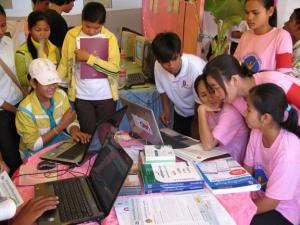By FD Publisher: APCNews Montreal,
Published onPage last updated on
 Open Institute workshopHave you ever worked on a document using software in the Khmer language?
Open Institute workshopHave you ever worked on a document using software in the Khmer language?
More and more people answer “Yes!” thanks to the hard workers behind APC’s new member in Cambodia, the Open Institute (OI).
Well known by the APC community for many years, the KhmerOS project advocates did some serious overtime in 2007 along with a few journalist colleagues. That is how they managed to found the Open Institute, where they concentrated all their prior expertise and achievements.
Kong Sidaroth, OI’s Open Learning programme coordinator, served on APC’s board of directors in 2006 and 2007. It is with great pleasure that APC formally welcomes her and her colleagues of the Open Institute to the APC network.
“We see ourselves as facilitators,” explained Chim Manavy, executive director of the start-up NGO. “We facilitate communication, knowledge-sharing and gender equity through the strategic use of ICT and of the Khmer language”. What this means on the ground, is easy to understand when one takes a look at the track record of OI’s colleagues.
The Khmer software initiative is not the only one. It is joined here by women’s empowerment projects, open schools and learning ventures, even a lexicography project. The Cambodian group’s expertise in the strategic use of information and communication technology is far-reaching.
But how exactly does this all shape up into an institute? “Well firstly, we have a mission: that Cambodia should be a country where people have equal access to knowledge, information and technology, as a path to facilitate overall economic development” says Manavy. “Once established, we decided to run six programmes: the Khmer software Initiative, the Open Schools Programme, Women’s empowerment for social change, Open Learning, Publications and Lexicography.”
The Khmer software initiative (KhmerOS) is the Open Institute’s flagship. It started with the idea of offering technological development that would be egalitarian, supporting widespread technological development in Cambodia. Local language and free and open-source software where identified as two powerful ingredients in providing better access to the tools that are globally being used.
For instance the development of the localised OpenOffice desktop suite in Khmer was a great success. But only after it was applied to real life situations and taught to avid users in NGOs, all schools, small and medium sized enterprises and the Cambodian government.
“The most significant change this brought about was to give people without formal education or without foreign language knowledge access to jobs that require the use of a computer,” explained Manavy from Phnom Penh.
For its part the Open Schools Programme-a joint project of the Open Institute and the Cambodian Ministry of Education, Youth and Sport-is directed at improving teaching of ICT in Schools, by using only FOSS Khmer language applications. It focuses on providing ICT skills to teachers and students and on improving the quality of education through ICT.
OI’s Open Learning programme which aims at empowering educational institutions to start using elearning in their educational programmes is developing all the necessary content related to elearning implementation and development and technology in the Khmer language. Capacity-building on elearning knowhow, practical experience and ready-to-use technology will be provided to educational institutions.
OI’s very active women’s empowerment programme seeks to join all the organisations working on women’s issues and gender equality in Cambodia in a network. “The Women’s web portal helps create synergies among those working to defend women’s rights. We also want to train more women in the use of ICTs, and provide electronic tools such as mailing lists, blogs and forums.”
All the efforts invested by the Open Institute since its first steps in 2006 are aimed at actively promoting and encouraging women and men to gain experience in expressing themselves through ICTs. This is precisely why OI’s website hosts weekly editorials and news from Cambodia. “This encourages social and political discussion and develops the habit of communication,” affirmed Manavy.
“Open Insititue”:http://www.open.org.kh/en


